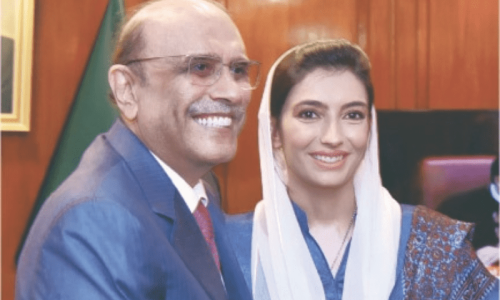KARACHI: Two summers ago, social media star Qandeel Baloch was strangled to death by her brother. Her death sent shockwaves across the country and abroad with newspapers and magazines running headlines like “Pakistan’s Kim Kardashian murdered in ‘honour killing’”. Qandeel’s story will be revisited in author Sanam Maher’s book The Sensational Life and Death of Qandeel Baloch, which will be available at bookstores this month.
Talking to Dawn, Ms Maher discussed who Qandeel was and why she is relevant even today.
“The first time I heard about Qandeel was in the newsroom, when a couple of guys who worked at the desk with me were talking about her viral ‘How I’m looking?’ video. I looked her up and the little that I did see led me to want to do a story — I thought the piece would look at how young women are using platforms like Facebook and Instagram to push the envelope on how they can dress, speak or present themselves in Pakistan,” she said.
“I’ve long maintained a fascination with what we as Pakistanis do on social media and I thought Qandeel would be a great person to focus on for a piece exploring this. I would see Qandeel’s videos or photos whenever someone I knew would share them on Facebook, and then when it became popular to imitate her in DubSmash videos, but my piece was never written, lost somewhere between deadlines and switching jobs. The idea stayed with me, and I told myself I’d have time to do it later, to meet Qandeel later and to find others like her.
“In July 2016, I remember staring at the television the day news of Qandeel’s murder broke, and feeling stunned. I didn’t want to let go of her story once again. The idea of this woman who had managed to fool all of us — her audience and the media — and who had created this persona that we had bought into wholesale took root. I admired her gumption and the courage it must have taken to create the persona that she did,” she added.
According to Ms Maher, in the following hours and days it was terrible to see the reactions online from many Pakistanis who were happy that she had been “punished” for behaving the way she did. “The reactions to Qandeel’s murder have revealed two very different answers to the question of what it means to be Pakistani, and more crucially, what it means to be a woman living in Pakistan today. And this definition is not static, but ever evolving, depending on who you’re talking to. I wanted to tell a story not just about Qandeel, but about that moment and that definition. I knew that this book wasn’t just about Qandeel, but about the kind of place that enabled her to become who she did, and the place that ultimately found that it could not tolerate her,” she said.
Explaining how she approached the topic, the freelance journalist said while hers is very much a book about who Qandeel was, it also tries to answer another question: What did we see reflected back to us when we watched Qandeel’s videos or looked at her photographs? “The book uses parts of Qandeel’s life to open up into a story about Pakistan at this particular moment.”
Ms Maher said that with every new piece of information she received about Qandeel, she felt, “Yes, this is it, I understand her now,” only to learn something else and be utterly confounded again.
“Everything I was learning about Qandeel in the interviews I did was second-hand information, and then there was the problem of this information having been repeated so many times — particularly when it came to the principal ‘characters’ in her life, such as her manager Mec or her parents, as they had been interviewed so many times for news stories or documentaries on Qandeel,” she said.
“Before I went to Multan, I had read and seen everything that had been put out on Qandeel and her murder. I believed I knew what had happened and I went to Multan with a plan to report on what I thought was a neatly aligned story. I was so completely confounded because most of the stuff I was encountering or hearing hadn’t been covered in whatever I’d seen and read. And yet, everyone I met was convinced that they knew ‘the Qandeel story’. I don’t want to be a part of that, and ultimately, I decided that I would use all the inconsistencies and lingering questions to force readers to question their understanding of Qandeel and whatever she did,” she added.
Mufti Qavi
“I think that while in theory I had an understanding of how brave Qandeel must have been in order to make a life for herself the way she did, I didn’t fully grasp it until certain points in my research,” said the author.
“The most vivid example of this is from my time with Mufti Qavi. He initially agreed to give me 45 minutes of his time and that turned into a six-hour or so conversation... Spending that time with him and hearing how he thought of everything that had happened, and of Qandeel, I felt — and I know this may not be the most professional of confessions — this surge of anger towards him.
“That was the moment when I truly appreciated how much courage it takes for women like Qandeel to confront these men publicly and call them out for behaviour that is unacceptable. It is not easy to do, knowing the ridicule and hateful messages that will follow after you do something like that in Pakistan, and especially when the man you’re calling out has a certain status, particularly as a religious leader,” she said.
Published in Dawn, May 26th, 2018
















































Dear visitor, the comments section is undergoing an overhaul and will return soon.